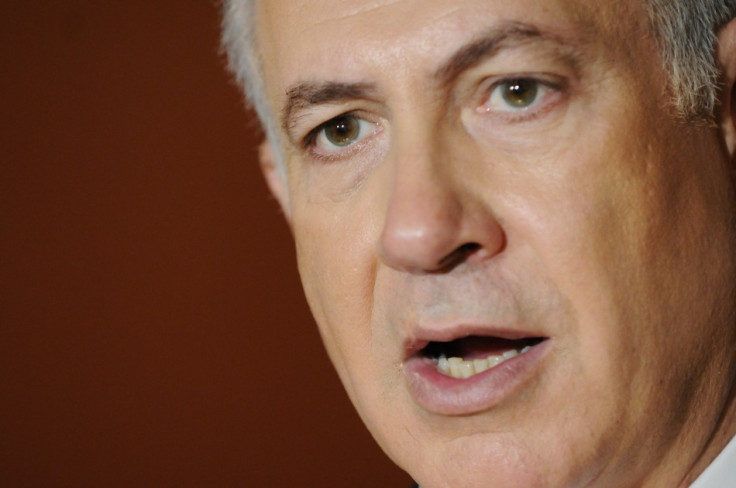Netanyahu's speech in the American congress : Israel stands firm

After Obama's Middle East speech last week, Israeli Prime Minister Benjamin Netanyahu swiftly drafted an official statement that was a first response to the U.S. President's demand to consider the 1967 border proposal as a starting point for negotiation. The tone was clear and firm, with Mr Netanyahu insisting on a common point Israel shares with the U.S.: national security is what is primordially leading the country's foreign policy.
"Israel appreciates President Obama's commitment to peace. Israel believes that for peace to endure between Israelis and Palestinians, the viability of a Palestinian state cannot come at the expense of the viability of the one and only Jewish state."
The statement then acted as a reminder of America's past promises as the Prime Minister asked Obama to follow suit on a commitment taken on by the previous Bush administration in 2004.
Among other things, those commitments relate to Israel not having to withdraw to the 1967 lines which are both indefensible and which would leave major Israeli population centers in Judea and Samaria beyond those lines.
The tone of Netanyahu's visit in the United states was thus set: Israel will not easily change its position or agree to any demand just because Obama think that's the way forward.
The visit of the Israeli leader unfortunately coincided with Mr Obama's trip to Europe which prevented the leaders from meeting up.
Arriving in the U.S. Congress on Tuesday, Netanyahu told his audience: "It's time for President Abbas to stand before his people and say: I will accept a Jewish state - with those words, I will be prepared to make a far-reaching compromise.'
While he was formally talking to the assembly attending his speech, the Israeli PM was also well aware that Obama as well as the Jewish diaspora would listen very carefully.
Coming back on the long shared history between the two countries the Prime Minister said:
"Israel has no better friend than America. And America has no better friend than Israel. We stand together to defend democracy. We stand together to advance peace. We stand together to fight terrorism," before congratulating the U.S. on its latest operation in Pakistan that led to the death of Al-Qaeda number one: "Congratulations America, Congratulations, Mr. President. You got bin Laden. Good riddance!"
Following the formal greetings and congratulations, Netanyahu was however quick to point out his country's position in the region by warning that: "My friends, you don't need to do nation building in Israel. We're already built. You don't need to export democracy to Israel. We've already got it. You don't need to send American troops to defend Israel. We defend ourselves."
Judging from the warm welcome he received in the Capitol building it seems Netanyahu managed to win over the Congress. Many American observers were disturbed by Obama's attitude and very public statement to Israel as the country is clearly the longest ally America has had in the region. Blaming the U.S. President's tendency to let down familiar friends in favour of new alliances, some even deemed it a betrayal.
The way the White House has received the speech however remains the most important one, as the more the U.S. administration pushes for a come back to the negotiating table, the more Israel backs away from it. The backlash comes as the American President has put a lot of efforts into trying to improve his nation's image in the Muslim world and publicly vowed to support and guide pro-democratic regimes in the region.
Mr Netanyahu also came back on the Arab spring, although with a rather different point of focus. Coming back on the Iranian revolution and thus also implicitly recalling the very controversial support the U.S. gave to the Shah, he explained that "These extraordinary scenes in Tunis and Cairo, evoke those of Berlin and Prague in 1989....Yet we also must also remember that those hopes could be snuffed out as they were in Tehran in 1979. You remember what happened then."
As the Israeli leader continued his speech he also insisted on the difference between Israel and other Middle Eastern states by projecting what can be seen as a Manichean image of the good and the bad by stating that "In a region where women are stoned, gays are hanged, Christians are persecuted, Israel stands out. It is different"
While Obama has recently widely praised the Middle East and North African people, Netanyahu's point of view is more adamant. The PM has instead opted for a more intransigent attitude, which can be explained by the fact that Israel is clearly positioned in a zone where close allies are lacking.
He finally concluded his speech with a close up on the current situation. Shying away from discussing in depth what are the real obstructions to the end of the Israeli-Palestinian conflict, he however chose to see the main obstacle as the Palestinians:
"So now here is the question. You have to ask it. If the benefits of peace with the Palestinians are so clear, why has peace eluded us? Because all six Israeli Prime Ministers since the signing of Oslo accords agreed to establish a Palestinian state. Myself included. So why has peace not been achieved? Because so far, the Palestinians have been unwilling to accept a Palestinian state, if it meant accepting a Jewish state alongside it."
Between Hamas denying the existence of Israel and Israel solely blaming Palestinian leaders for the current situation one thing is sure, the conflict is unlikely to end anytime soon.
© Copyright IBTimes 2025. All rights reserved.





















